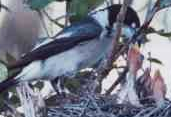Year Of The Bat - Bats Are Our Allies
Bat Fertilizer
Bats are also the primary energy producers for many cave ecosystems. Guano deposits beneath their roosts provide energy that sustains thousands of unique life forms, from bacteria and fungi to arthropods and small vertebrates. These organisms are often endemic to a single cave or cave system, but provide a potential treasure trove of biodiversity needed for solving human problems, from production of new antibiotics and gasohol to improved detergents and waste detoxification.
(Copyright for all the photographs in this article belong to Dr Merlin Tuttle, Bat Conservation International, www.batcon.org)

Additionally, extraction of bat guano for fertilizer provides an invaluable renewable resource for whole communities in developing countries from Asia and Africa to Latin America. For example, due to this eco-service of bats, Thailand’s Khao Chong Pran Cave has become a major source of income for the local community, as well as a unique tourist attraction. Careful protection and harvest management have allowed annual guano sales to increase from $10,000 to $135,000. Bat guano is big business.
From Terror to Tourist Attraction

(Copyright for all the photographs in this article belong to Dr Merlin Tuttle, Bat Conservation International, www.batcon.org)
Year of the Bat 2011-2012
Unfortunately, many people in other locations around the world still misunderstand, fear and persecute bats at great harm to themselves. Too many have heard only of vampires and disease, both of which have been greatly exaggerated by sensational media stories.
Needlessly fearful humans, in Latin America, have mistakenly destroyed thousands, even millions of highly beneficial bats at a time by sealing, burning or poisoning roosts, especially in caves, and many more bats have been lost through simple neglect of their conservation needs.
Ironically, even the common vampire bat of Latin America has proven useful. A new drug, Desmoteplase developed from research on vampire saliva, appears to greatly improve treatment of stroke victims, a potentially enormous contribution to human wellbeing. Who would have thought that a bat – and a vampire, at that – could help save countless lives?
Year of the Bat  (2011-2012) celebrations will highlight bat values
(2011-2012) celebrations will highlight bat values  and needs, providing unique introductions to these incredibly fascinating animals that unfortunately rank among our planet’s least understood and most rapidly declining and endangered animals. But as more people learn about and account for the ecosystem services provided by bats, greater conservation efforts will be made to ensure the survival of these fascinating and essential creatures.
and needs, providing unique introductions to these incredibly fascinating animals that unfortunately rank among our planet’s least understood and most rapidly declining and endangered animals. But as more people learn about and account for the ecosystem services provided by bats, greater conservation efforts will be made to ensure the survival of these fascinating and essential creatures.
Year of the Bat 2011 – 2012 is a global campaign to promote conservation, research and education about the world’s only flying mammals. Year of the Bat is supported by the United Nations Environment Programme, the Convention on the Conservation of Migratory Species and EUROBATS, as well as numerous partner organizations around the world.
*Information provided by TEEB
- Chapter 2 Page 37 TEEB Ecological and Economic Foundation
 Nabhan, G.P. and Buchmann, S.L. 1997. Services provided by pollinators. In: Daily G.C. (ed.) Nature’s Services: Societal Dependence on Natural Ecosystems. Island Press, Washington, D.C. pp. 133–150. [↩]
Nabhan, G.P. and Buchmann, S.L. 1997. Services provided by pollinators. In: Daily G.C. (ed.) Nature’s Services: Societal Dependence on Natural Ecosystems. Island Press, Washington, D.C. pp. 133–150. [↩] - Chapter 2 Page 37 TEEB Ecological and Economic Foundation
 Klein, A.M., Vaissière, B.E., Cane, J.H., Steffan-Dewenter, I., Cunningham, S.A., Kremen, C. and Tscharntke, T. 2007. Importance of pollinators in changing landscapes for world crops. Proceedings of the Royal Society B – Biological Sciences 274: 303–313. [↩]
Klein, A.M., Vaissière, B.E., Cane, J.H., Steffan-Dewenter, I., Cunningham, S.A., Kremen, C. and Tscharntke, T. 2007. Importance of pollinators in changing landscapes for world crops. Proceedings of the Royal Society B – Biological Sciences 274: 303–313. [↩] - Chapter 2 page 38 TEEB Ecological and Economic Foundation
 Pimentel, D. 2008. Conservation biological control. Biological Control 45: 171. [↩]
Pimentel, D. 2008. Conservation biological control. Biological Control 45: 171. [↩]
About Dr. Merlin D. Tuttle
Dr. Merlin Tuttle is an ecologist, award-winning wildlife photographer and leading conservationist who has studied bats and championed their preservation for more than 50 years. He is known worldwide through his scientific discoveries, media appearances, popular articles and photographs. In 1982, Dr. Tuttle founded Bat Conservation International (BCI), an organization devoted to research, education and conservation of bats. Dr. Tuttle’s award-winning photographs and television specials have brought bats into the public eye. Broadcasts include Merlin’s Bats (National Geographic Television), Merlin Tuttle, Guardian Angel of Bats (Heroes of Nature European TV series) and the documentary The Secret World of Bats, which spotlighted Tuttle’s conservation efforts and has aired in more than 100 countries. Dr. Tuttle is an Honorary Ambassador for the Year of the Bat campaign. For more information please visit www.yearofthebat.org and http://on.fb.me/Yearofthebat
Pages
- « first
- ‹ previous
- 1
- 2
- 3

 del.icio.us
del.icio.us Digg
Digg Facebook
Facebook Google
Google Google+
Google+ LinkedIn
LinkedIn MySpace
MySpace Ping This!
Ping This! SlashDot
SlashDot StumbleUpon
StumbleUpon Twitter
Twitter Yahoo
Yahoo



